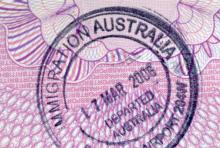Jane Playdon, QS education writer
The recently elected Australian Coalition government is focusing on overhauling the country’s largest service export: higher education. This follows a decline in the number of international students choosing to study in Australia of around 20% since 2010, according to figures from Australian Education International.
In his first interview as the new Education Minister, Christopher Pyne spoke of a need to “repair” the Australian higher education sector, saying the government would be concentrating on streamlining the visa application process and reviewing policies on post-study work rights for international students.
Promoting Australian higher education worldwide
 The government is also prioritizing efforts to market Australian higher education around the world. Since 2011, the Australian Trade Commission (Austrade) has been developing the Future Unlimited brand for this purpose. This moves away from an earlier focus on lifestyle and affordability as key incentives to study in Australia, instead placing greater emphasis on the future benefits students can expect.
The government is also prioritizing efforts to market Australian higher education around the world. Since 2011, the Australian Trade Commission (Austrade) has been developing the Future Unlimited brand for this purpose. This moves away from an earlier focus on lifestyle and affordability as key incentives to study in Australia, instead placing greater emphasis on the future benefits students can expect.
Assistant General Manager of the International Education Division of Austrade, Quentin Stevenson-Perks, said: “Future Unlimited is very heavily dependent on student stories… all about demonstrating the relevance of Australian qualifications to students.”
This is the focus of a Future Unlimited competition launched by the new Trade and Investment Minister, Andrew Robb, less than a month after coming to power. Called Win Your Future, the competition offers the chance to win a year’s free tuition, accommodation, health cover and spending money for the applicant who gives the most compelling explanation of why studying in Australia would be beneficial for his/her career and aspirations. So far, thousands of prospective students have entered.
Writing in The Australian, Robb predicted: “It will encourage thousands of potential international students to consider Australia as their study destination and will reinforce positive perceptions about Australian education.”
More personal reasons to study in Australia
 Thomson Ch’ng, President of the Council of International Students (CISA), has pointed out that the decision-making process for prospective international students remains a complex one. “It is good to raise awareness on what Australia has to offer towards the future of international students, but at the end of the day, the decision process to choose a destination for study involves taking a range of factors that suit individual's needs and demands into consideration.”
Thomson Ch’ng, President of the Council of International Students (CISA), has pointed out that the decision-making process for prospective international students remains a complex one. “It is good to raise awareness on what Australia has to offer towards the future of international students, but at the end of the day, the decision process to choose a destination for study involves taking a range of factors that suit individual's needs and demands into consideration.”
This point is echoed by Stevenson-Perks: “It’s not one particular factor that attracts students to our country, it’s a range. Price is a part of it, quality is a part, work experience, and some of it comes down to community relations and family ties.”
To address these different factors, Austrade has redeveloped the Study in Australia website, which highlights the strong presence of Australian universities in the QS World University Rankings, as well as providing information about costs, scholarships and internships. Alongside the facts and figures, student stories are provided to give more personal insights.
Student stories are also the focus of a website run by CISA called “I’m not Australian but I have an Australian Story”. This aims to “raise awareness about international students’ presence and their participation in and contribution to the Australian community”, and features videos of international students talking about their personal experiences, difficulties they’ve faced and how they’ve overcome them.
Austrade is looking at the CISA project to see how those stories can be used, Stevenson-Perks has said. “Working with the council of international students is in our favor, because we might think we know what international students needs are and what prospective students’ needs are, but clearly listening to the voice of the students in designing the [Study in Australia] website was important. A lot of work was done in terms of focus groups, focusing on what they want.”
Streamlined Australian student visa processing and post-study work visas
 Speaking recently at the Australian International Education Conference in Canberra, Pyne outlined plans to encourage more international students to study in Australia, following a decline in income from international education since 2009, from AUD$18.6 billion (USD$17.7 billion) to AUD$14 billion (USD$13.3 billion). Two key points he mentioned were streamlined Australian student visa processing and post-study work visas.
Speaking recently at the Australian International Education Conference in Canberra, Pyne outlined plans to encourage more international students to study in Australia, following a decline in income from international education since 2009, from AUD$18.6 billion (USD$17.7 billion) to AUD$14 billion (USD$13.3 billion). Two key points he mentioned were streamlined Australian student visa processing and post-study work visas.
Pyne said: “The new government will make it a priority to finalize the list of non-university providers to be offered the streamlined visa arrangement… Our government will also give priority to reviewing post-study work rights to bring about clearer and more appropriate rules that maximize opportunities for graduates to convert world-leading qualifications to meaningful, needed careers.”
Streamlined student visa processing and post-study work rights have already been implemented to a certain extent by the previous Labor government, following a report by former Sydney Olympics Minister Michael Knight in 2011. The report recommended streamlined visa processing for international students in selected courses at Australian universities, and also post-study work visas of between two and four years for students with a bachelor’s degree and above.
Since March last year, international students’ visa applications have been assessed as a lower migration risk. And international students who were granted their first visa on or after 5 November 2011 can apply for a Temporary Graduate Visa (subclass 485) to live and work in Australia for up to four years after graduating, depending on their level of study.
Message of welcome for international students
 Stevenson-Perks said there has already been a 30% increase in grants of Australian higher education visas for the financial year ending 30 June 2013. But the streamlined visa application process has so far only been available to students at universities. Pyne wants to extend that streamlining beyond the university sector to other providers of higher education, such as private colleges and technical and further education colleges (TAFEs).
Stevenson-Perks said there has already been a 30% increase in grants of Australian higher education visas for the financial year ending 30 June 2013. But the streamlined visa application process has so far only been available to students at universities. Pyne wants to extend that streamlining beyond the university sector to other providers of higher education, such as private colleges and technical and further education colleges (TAFEs).
Pyne also addressed the perception that international students want permanent residency in Australia, saying they are more likely to “want to make a contribution in their own countries, aided by their quality Australian education.” He added, “It’s all part of sending a message to students and their families across the Asia-Pacific and beyond that Australia welcomes, and is well placed, to host many more international students.”
Judging by the rapidly growing number of entries to the Win Your Future competition, this message is getting across. The first finalist [one of seven] was announced on Friday: Abigail Engleman from the US, for her digital postcard showing that she “knew why Australia was the best place for her to study in her chosen field of marine studies.”
Stevenson-Perks said: “The quality of the applications is steadily rising as people look at their competitors and think ‘gee, I’ve got to do better than that’, so I think by week seven [the last week of the competition] we’ll be seeing some very interesting entries.”
